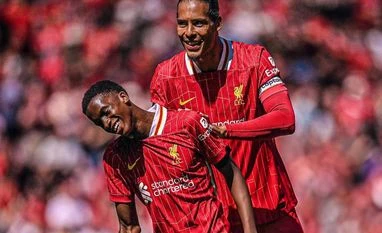Premier League to have different look this year. Here's what's changed
For the 2024-25 season starting on Friday, there are five newly hired managers, around $1.6 billion worth of new players (and counting), new offside technology, and updated financial regulations.
)
Liverpool Football Club (Pic-Twitter)
Listen to This Article
The Premier League rarely stands still.
For the 2024-25 season starting on Friday, there are five newly hired managers, around $1.6 billion worth of new players (and counting), new offside technology, updated financial regulations and a tweaked match schedule.
COACHING CHANGES
A quarter of the coaches will be taking charge of a Premier League game for the first time, with Liverpool ( Arne Slot ), Chelsea ( Enzo Maresca ) and Brighton ( Fabian Hurzeler ) all having new managers and both Southampton (Russell Martin) and Ipswich (Kieran McKenna) gaining promotion with managers owning no top-flight experience. Throw in Julen Lopetegui being the new guy at West Ham after 4 1/2 years of David Moyes at the helm and Steve Cooper replacing Maresca at Leicester, and the dugouts will look different this season. Most of the intrigue, however, will focus on Slot and what style he implements at Liverpool after the team's nearly nine years with the popular Jurgen Klopp. Rock n' roll could turn into more control, with Slot preferring more of a possession game.
SLOWER MARKET
The Premier League's 20 clubs have spent as much on new players in this transfer window as those in Spain, Italy and Germany combined, according to transfermarkt.com. So why does it feel such a slow summer of trading? Maybe because there have been no blockbuster deals, with the most expensive being striker Dominic Solanke moving to Tottenham from Bournemouth for 65 million pounds ($83 million). However, lots of deals for between $30-70 million quickly add up and there are still three weeks left in the window, during which Manchester City, Manchester United, Liverpool, Arsenal and Chelsea are expected to weigh in. City (Savinho) and Arsenal (Riccardo Calafiori) have only made one new signing so far and Liverpool hasn't made any. Come the end of transfer deadline day on Aug. 30, don't be surprised if Premier League clubs have spent way more than $2 billion even if most are balancing the books with sales because of the league's sterner financial rules.
SEMI-AUTOMATED OFFSIDES
Expect offside decisions to be reached much quicker in the Premier League this season. The competition is introducing semi-automated offside technology for the first time, with the new system set to be launched during the first half of the season. Multiple cameras will track player movements and record data points on parts of the body that are relevant for an offside decision. Data is processed with artificial intelligence to create a 3D offside line that is alerted to the team of VAR officials. It is expected to take an average of around 30 seconds off the length of time it currently takes VAR officials to come to a decision manually. Semi-automated offsides were used at the 2022 World Cup and at the recent European Championship.
SPENDING RULES
Last season in the Premier League was notable for some clubs, like Everton and Nottingham Forest, receiving points deductions for breaking the competition's profitability and sustainability regulations, which are now being more strictly applied. This coming season is the final year of those regulations, with two new forms of spending caps being trialed ahead of their introduction from the 2025-26 season. Teams in England's top division will trial a Squad Cost Rules system, which will limit spending on players to 85% of a club's soccer revenue and net profit or loss on player sales. A second system called Top to Bottom Anchoring limits or anchors spending to a multiple of the lowest combined prize money and cash from TV rights forecast to be earned by a team. The league said the systems aimed to improve and preserve clubs' financial sustainability and the competitive balance of the Premier League as well as promote aspiration of clubs.
NO WINTER BREAK
The Premier League is renowned for being a relentless slog even more so this season. There's no winter break for clubs this time, with the season starting later, to give players more time to recover from international tournaments this summer, and therefore being squeezed. Last year, for example, five games were held each weekend over a two-week period, giving teams at least one weekend off over January. All of Europe's other big leagues will have a winter break.
(Only the headline and picture of this report may have been reworked by the Business Standard staff; the rest of the content is auto-generated from a syndicated feed.)
More From This Section
Don't miss the most important news and views of the day. Get them on our Telegram channel
First Published: Aug 14 2024 | 12:00 PM IST